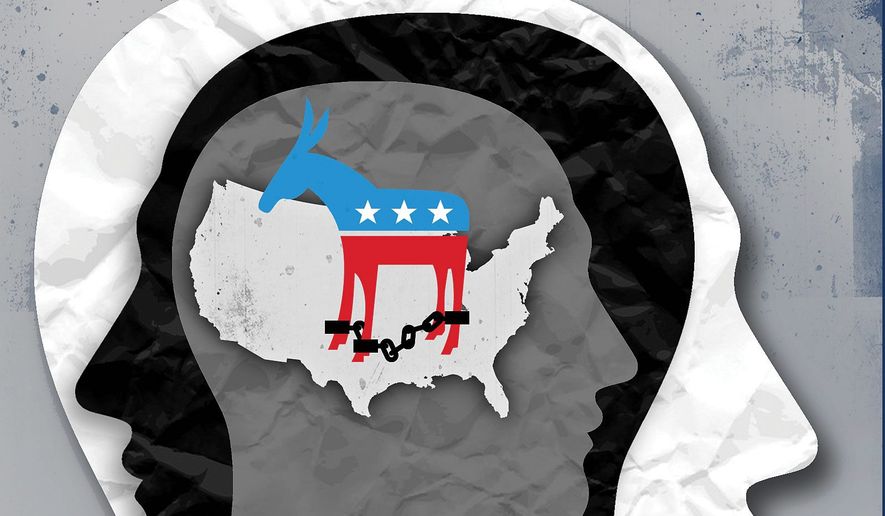OPINION:
These past couple of weeks have been some of the saddest I’ve seen in my lifetime as an African-American. It began with the tragic, needless, death of George Floyd, but then quickly escalated into some of the most vicious, violent rioting our country has seen in decades.
The Democratic Party, true to form, never lets a crisis go to waste. It has seized on what should be a time of healing and instead made the conversation more divisive by lecturing us all about how systemic racism is supposedly rampant in the United States. The great irony here is that yes, there’s plenty of systemic racism in our country; it’s all wrapped up in the history of the Democratic Party.
The rot goes deep, back to the post-Civil War era. Former slaves and their children were forced for decades to endure the cruel, wretched Jim Crow laws that kept them from advancing in the South. And who was all too happy to keep those laws in place? The Democrats.
The Republican Party had planks in its party platforms addressing the rights of African-Americans in the early 20th century. The Democrats, meanwhile, used the KKK as their stormtroopers, lynching and terrorizing blacks in the South beginning just after the Civil War and continued this practice for a century.
As early as 1888, the Republican platform included a plank affirming the “sovereign right of every lawful citizen, rich or poor, native or foreign born, white or black, to cast one free ballot in public elections, and to have that ballot duly counted.”
In 1892, the Republican platform specifically condemned the “inhuman outrages perpetrated upon American citizens for political reasons in certain Southern States of the Union.” The Democrats, those paragons of virtue, refused to include anti-lynching planks or planks addressing racial rights in their platform for all of the early 20th century.
This was the era of Woodrow Wilson, a Democratic president who modern Democrats like to conveniently forget re-segregated different federal government agencies during his presidency. There was also a little racist movie called “Birth of a Nation.” Wilson loved it so much he thought it would be a great idea to screen it at the White House and viewed the film multiple times.
A few years later, Wilson’s fellow Democrat and President Franklin Roosevelt was forward-thinking and progressive enough to express his distaste for Asian immigrants, and said that immigrants in general had brought “congestion and racial prejudices to our large cities.” He would later deny entry into the U.S. to Jews who fled from Nazi-controlled Europe during Hitler’s purges. Years earlier, while on the Harvard Board of Overseers, Roosevelt helped impose a limit on the number of Jewish students allowed admittance to the university.
And of course, Roosevelt forced some 175,000 Japanese-Americans into camps throughout the desert Southwest during World War II, trampling all over their constitutional rights just because they looked different.
One of Roosevelt’s staunchest supporters was U.S. Supreme Court Justice Hugo Black, who was nominated to the high court in 1937 by Roosevelt. FDR’s pal Justice Black was also, for what it’s worth, a member of the Ku Klux Klan.
During the 1950s and the beginning of the Civil Rights era, Virginia Democratic Sen. Harry Byrd was so vehemently against the landmark Brown v. Board of Education decision that he took the time to write a “Southern Manifesto” that opposed desegregation in American schools.
The latter half of the 20th century brought plenty more of its share of racist Democratic politicians.
Lyndon Johnson, who now is lauded as a hero for passing the Civil Rights Act, was fond of using the N-word behind closed doors and even changed his pronunciation based on regional dialect. Prior to 1964, Johnson was a stalwart against civil rights legislation in Congress and was a leader in the massive Southern Resistance movement of Southern states that opposed integration in the 1950s.
Jimmy Carter, who loved falsely branding anyone who disagreed with him a racist, such as Ronald Reagan, supported legislation in the Georgia State Senate that would have eviscerated the Civil Rights Act in the early 1960s as well as housing rights. And in 1976, Mr. Carter stayed with the Plains Baptist Church even as it voted against allowing blacks to join.
Even in the modern era, when we’re all supposed to be above such evilness, Democrats are still stuck in their old ways. Nothing has changed for the Democratic Party.
Gov. Ralph Northam, Virginia Democrat, wore blackface while in grad school in the 1980s. Or it might have been a KKK hood. We’re still not sure which. Virginia Attorney General Mark Herring, a Democrat, also has a racist past. Why aren’t they being protested? Just this week, the congressional Democratic leadership committed the worst kind of faux pas by posing in traditional Kente cloth in an attempt to out-woke the virtue signaling rioters in our streets. Black leaders were not impressed.
Systemic racism is indeed a vile problem, one that must be addressed immediately. When Democrats stop pointing fingers and look in the mirror, we can begin the conversation about where the systemic racism truly lies.
• Bishop Aubrey Shines is chairman of the newly-formed Conservative Clergy of Color and founder of Glory to Glory Ministries.




Please read our comment policy before commenting.